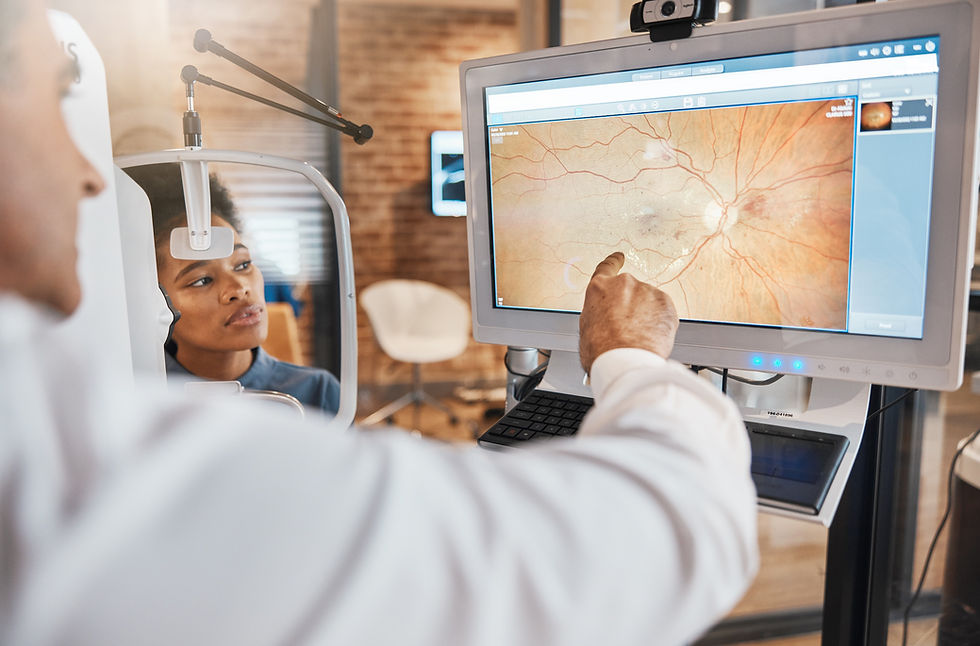Ask an Eye Doctor: COVID-19 and the eye
- by Dr. Z Aleksic

- Sep 11, 2020
- 3 min read
As the year of COVID-19 has brought a myriad of changes to the world, our lives have changed considerably as we adjust to the “new normal.” There have been health changes, lifestyle changes and alterations in the work-life balance which have all been implemented in an effort to “flatten the curve.” Yet, as these changes continue with time, we have seen that each of these areas have resulted in several new ways to deal with eye health. Although COVID-19 is not something to undermine, I would like to urge my patients that this new normal need not be stressful or alarming in any way, and that safe eye-care practices can continue with ease.
This is how life has (or hasn’t) changed for my patients’ eye health:
Patient Emergencies
The most common concern which has been raised by my patients is whether their eye emergencies will receive sufficient attention when a pandemic is sapping doctors and surgeons of their medical capacity, whilst hospitals are overrun with virus patients. What needs to be made clear is that, pandemic or no pandemic, your emergencies are still emergencies. Eye surgeons will always be available to treat your urgent conditions, and any substantial changes in your vision should not be ignored. Your ophthalmologist will always be available via a phone call, and thereafter a treatment option can be discussed going forward. Diabetic retinopathy, macular degeneration and eye injections, are all medical conditions and procedures that will never take a backseat in the eyes of your ophthalmologist, and you should always make them aware of considerable changes in vision (like blurry, wavy or blank spots in your field of vision), floaters, vision loss, red eye, eye pain or eye injuries, especially if associated with headache, nausea or vomiting.
That being said, despite the fact that your emergencies will remain the same and be equally important, there are certainly some small changes which would need to be made in order to protect yourself and your eyes during the pandemic.
Contact Lenses
The next concern is with contact lens wearers. Naturally, these patients are more susceptible to touching their eyes when putting in contacts and taking them out. It is crucial that these patients make sure that their hands are extremely clean when doing this. In fact, they should be doing this regardless. Patients must change their contact solution frequently and follow their usual hygiene routine. Some have suggested that contact-lens patients could refrain from wearing contacts during this time and stick to their glasses. It is true that wearing glasses instead of contacts could lessen the likelihood of you touching your eye as you are not fiddling with contacts or touching the eye when putting in contacts. That being said, these changes should not impact your life in any way and there is no evidence that contact lens-wearers are at higher risk than other patients. Glasses could also act as a barrier to prevent you from touching your eyes, as well as being a physical barrier to germs and disease, almost like safety goggles.
Screens... Everywhere
Another change that has come with the new normal involves screen time. As the world transitions to start working from home, this means that people are juggling Zoom meetings instead of face-to-face meetings, and screens are even more omnipresent in the home. This is great because it means that people can continue to work seamlessly during the pandemic, but it also poses many concerns for health. Ensure that your screen is an adequate distance from your eyes. Do not strain your eyes to read fine print and keep the brightness of the screen low, when possible.
Symptoms of COVID-19
The final change in this new world is the reality of eye symptoms which are related to a COVID-19 infection. One of the possible signs of COVID-19 could be conjunctivitis, more commonly known as pink eye. Burning, mild discharge, eye crusting upon waking and scratchy eyes are other symptoms of pink eye which can be noted, however it is extremely unlikely that pink eye alone means you have COVID-19. Uncoupled with fever, dry cough and shortness of breath, it is unlikely to be anything other than merely pink eye. Nonetheless, contact your eye doctor for adequate treatment of pink eye.
As you can see, hygiene and general healthy practices are of equal importance to the world, pandemic or no pandemic. Be aware, eliminate stress and most importantly, wash your hands.




Comments